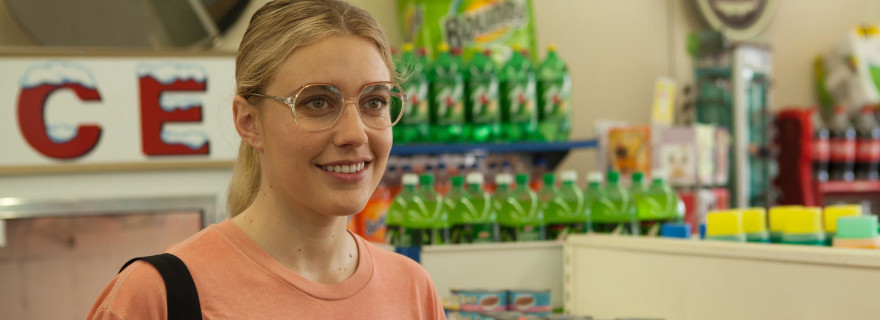'Wiener-Dog'
Movie Rating:
4
Writer/director Todd Solondz is an acquired taste, but for those who’ve developed the buds for his particular brand of empathetic misery comedy, there are few filmmakers today more fascinating.
After creating quite possibly the greatest of all high school misfit comedies (or at least the most honestly vicious) in ‘Welcome to the Dollhouse’ and delivering a masterpiece of suburban satire in ‘Happiness’, Solondz seemed to become determined to alienate as many members of the small audience he courted. His subsequent films such as ‘Palindromes’ and ‘Life During Wartime‘ hinged on artistic experiments that diluted some of his powers of observational character comedy/tragedy with too many art house tricks and tics. They’re still quite intriguing works, but it’s nice that in his last film, ‘Dark Horse’ (quite underrated by the way), and now his latest anthology feature ‘Wiener-Dog’, Solondz has somewhat stripped back to basics. Granted, we aren’t talking about cheery crowd-pleasers here, but at least the movies are powerful works to help the lonely feel less alone.
‘Wiener-Dog’ is a four-part anthology about the unavoidable march of death and the endlessly amusing sight of a dachshund. Each story seems to take a step forward in life and are well worth examining individually, yet they combine into something more richly satisfying.
The first tale comes from the perspective of a child, but with this being a Solondz film, expect no cloying cuteness. The impressively sad-eyed Keaton Nigel Cooke stars as Remi, a young cancer survivor whose father (playwright Tracy Letts) buys him the titular wiener-dog to cheer him up. His mother is played by Julie Deply as an amazingly selfish and overbearing head of a household rooted in good old-fashioned guilt and shame. A doggie diarrhea problem forces some harsh life lessons both spoken and observed by the youngster, who’s already more aware and mature than his parents.
From there, Solondz jumps forward to twenty-somethings and back to his Dawn Wiener character from ‘Welcome to the Dollhouse’, now played by Greta Gerwig. She picks up the traveling dachshund and meets up with someone from her past for a melancholically inspiring tale of lost and lonely souls finding connection (however imperfect). It’s as optimistic as Solondz gets and oddly touching between all the bleak laughs.
The third story centers on middle age malaise, following Danny DeVito as a formerly successful screenwriter and currently struggling film professor dealing with a generation of self-absorbed film students who have no interest in storytelling. There are some big laughs here and DeVito is an ideal disturbed schmuck in the filmmaker’s mold. However, there’s also some cruel self-indulgence as the director is clearly getting cathartic laughs out of poking easy fun at some of the students that the part time prof no doubt teaches himself. Both the middle chapters are the weakest in the anthology. That said, the segments would be highlights in most other filmmakers’ work, so we aren’t exactly talking failure here.
Finally, Solondz tackles old age and death head-on with the remarkable Ellen Burstyn getting a visit from her troubled granddaughter (Zosia Mamet) and a hysterical art gallery cliché named Fantasy (Michael James Shaw). This leads her to vividly and literally confront the failed paths in life that she never took. The final chapter in the anthology might not wrap things up in a cozy narrative sense, but it lays out the themes of the piece bare in a deeply moving and troubling way.
Together, the four shorts form some sort of grand statement about life that’s both pointed and deliberately absurd, all building up to a graphic, if inevitable, punchline. Of all the director’s experiments in abandoning narrative for tone, character and concepts, this is one of his most cohesive. Although still open for interpretation, the film has a clear and concise focus with some great writing. It’s both an angry and compassionate portrait of the fringe outsiders that Solondz proudly considers his own. Plus, it has a spectacular music video montage of a wiener-dog looking silly. Solondz is a weird guy, in the best possible way.
Thanks to re-uniting with genius cinematographer Edward Lachman following their work on ‘Life During Wartime’, the film also boasts a beautiful glow that gives it a dreamlike quality. This is not necessarily a story set in reality, more of a heightened vision of recognizable worlds and characters that invites laughs and examination. ‘Wiener-Dog’ is easily the most accessible film that the director has made in years, which means it’s still not exactly for everyone, but at least won’t leave viewers shuffling out of the theater in a painful slump like some of his most grueling efforts. It’s practically warm and inviting by Todd Solondz standards, while still offering some of the most bitter comedy and subtle empathy you’ll see on screen this year.




SugarBear
Seems that a Wiener , in some form, is mandatory in all his films…
(Whether a dog, Dawn, or Philip Seymor Hoffman’s wang…)